Tuesday Plenary Speakers
Chad Berginnis, CFM
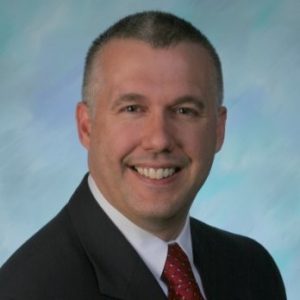
Chad Berginnis became executive director of ASFPM in July 2012, after joining the association staff as associate director in 2011. Since 2000, he served the association as Insurance Committee chair, Mitigation Policy Committee coordinator, vice-chair, and chair. He has a Bachelor of Science in natural resources from Ohio State University. Since 1993, his work has focused on floodplain management, hazard mitigation and land use planning at the state, local and private sector level. As a state official, Berginnis worked in the Ohio Floodplain Management Program and was Ohio’s state hazard mitigation officer. As a local official, Berginnis administered planning, economic development and floodplain management programs in Perry County, Ohio. In the private sector, he was the national practice leader in hazard mitigation for Michael Baker Jr. Inc.
Rachael A. Dempsey
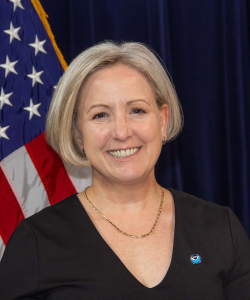
Rachael A. Dempsey is the National Ocean Service’s (NOS) first-ever deputy assistant administrator for navigation, observations, and positioning. With nearly 28 years as a Meteorology and Oceanography Officer in the United States Navy, Ms. Dempsey has broad meteorological and oceanographic prediction and operational application expertise and significant experience leading large, diverse organizations and managing financial resources. She also possesses an extensive background in cyber operations and network defense background.
Ms. Dempsey managed the Navy’s $2 billion undersea surveillance systems program and a variety of Navy Department research and development programs. As the Deputy Command Information Officer for Naval Information Forces, she oversaw critical network cybersecurity programs for over 70 subordinate organizations. Selected as one of the first women to serve as an information warfare commander at sea, she delivered innovative solutions to maintain adversarial advantage in the information sphere; as the maritime operations center director for Fleet Cyber Command, she was responsible for coordination and oversight of global navy cyber, space and communications operations.
Ms. Dempsey grew up in Upper Marlboro, Maryland, and is passionate about maritime environmental stewardship and its important role in economic and national security.
She earned her bachelor’s degree in marine science from Jacksonville University in Florida and holds master’s degrees in meteorology and oceanography from the Naval Postgraduate School and in national security strategy from the Naval War College in Newport, Rhode Island. Additionally, Ms. Dempsey earned a certificate for leadership in the intelligence community from the National Intelligence University in Bethesda, Maryland.
Ms. Dempsey is an avid gardener and lives with her husband and two children in Alexandria, Virginia.
Katie Jones
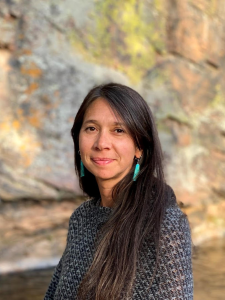
Katie Jones is an enrolled member of the Blackfeet Nation (Amskapi Piikani), and of mixed European descent. She is a Program Lead for the NSF NCAR Rising Voices Center for Indigenous and Earth Sciences and a Plant Ecologist at the National Ecological Observatory Network (NEON) in Boulder, Colorado. Her research interests include plant community interactions, climate change impacts on ecosystems, supporting reproducible analysis workflows, and integrating Indigenous data governance practices in open science research. As a member of the Rising Voices community and co-lead of the Earth Data Relations Working Group, Katie advocates for responsible data practices that prioritize transparency, mutual respect and co-production. She is committed to fostering collaborative research that incorporates diverse perspectives and relationships to ecological data, leading to more equitable and effective solutions.
Katie holds an MS in Botany and Plant Pathology from Oregon State University and a BS in Environmental Science from The Evergreen State College.
Wednesday Plenary Speakers
Jean Tanimoto

Jean has been with NOAA’s Office for Coastal Management since 2005, becoming the Regional Director for the Pacific Islands, which includes the state and territories of American Samoa, the Commonwealth of the Northern Mariana Islands, Guam, and Hawai‘i, in 2021. As part of her work with NOAA, she serves as a Navigator for the Indigenous Knowledge of the Environment (IKE) Hui for the Pacific Risk Management ‘Ohana as well as on the Advisory Committee for the Rising Voices Center for Indigenous and Earth Sciences.
Prior to her work with NOAA, Jean worked for Congresswoman Patsy T. Mink as well as in International Education. She received her Bachelors of Arts degree from Bucknell University and attended the University of Denver in a Masters in Business Administration program. She was born and raised in Waimea on Hawai‘i Island.
Tony LaVoi
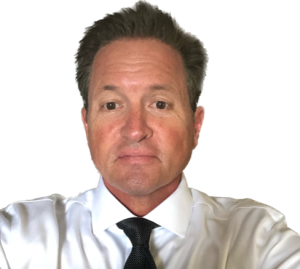
Tony LaVoi serves as the National Oceanic and Atmospheric Administration (NOAA) Chief Data Officer (CDO). As the CDO, he is the senior official responsible for NOAA’s data governance and management efforts, including NOAA’s Data Strategy and all aspects of its implementation. Prior to his CDO role, he served as the NOAA Geospatial Information Officer (GIO), and is currently the Department of Commerce’s Senior Agency Official for Geospatial Information. He’s a long-time member of the national geospatial community and is a current or former member of the National Geospatial Advisory Committee, Federal Geographic Data Executive Committee, Federal Emergency Management Agency’s Technical Mapping Advisory Council, Interagency Council for Advancing Meteorological Services, and United Nations Global Geospatial Information Management Committee of Experts.
Garet Couch
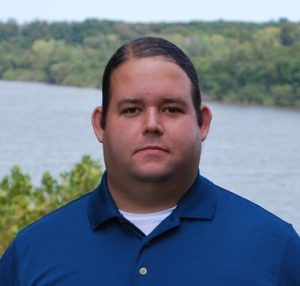
Garet Couch, GISP, is the President & CEO of the National Tribal Geographic Information Support Center (NTGISC), also known as Tribal GIS®, a national 501c3 non-profit organization with an objective to aid Native American Tribal Governments and Native American organizations regarding geographic information technology.
Garet is a certified GIS Professional (GISP), an enrolled citizen of the Shawnee Tribe, and has more than twenty-five years of professional GIS experience. During his career, he has served in numerous capacities supporting GIS activities across Indian Country, including six years as a member of the National Geospatial Advisory Committee (NGAC), a current member of the NGAC 3DEP Subcommittee, seven years as a member of the National Academies, Transportation Research Board, Standing Committee on Native American Transportation Issues, three years as the chair of the Shawnee Tribe Cultural and Historic Preservation Committee, along with fifteen plus years serving the NTGISC community in various capacities.
Garet supports sovereign tribal communities with an in-depth understanding of the intersection of Federal Indian and Geospatial policy and how geospatial technologies and research have been used to strengthen tribal communities through various applications. In addition, Garet continues to encourage professional peers, young adults, and the youth to enhance their GIS skills, which will open the doors to many opportunities in a number of career fields.
